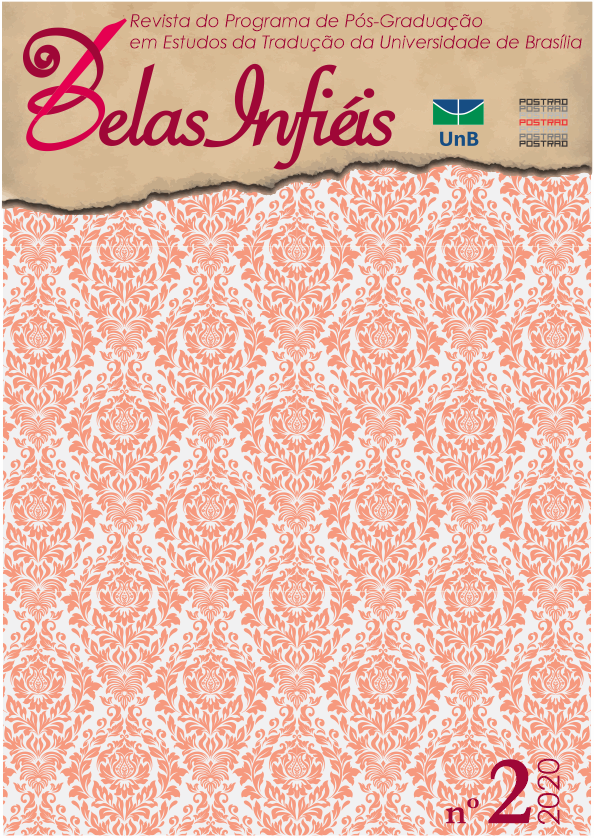Tradução do conto “Missing Out”, de Leila Aboulela
DOI:
https://doi.org/10.26512/belasinfieis.v9.n2.2020.27403Palabras clave:
Tradução. Conto africano. Sudão. Leila Aboulela.Resumen
O conto intitulado “Missing Out” data de 2010 e traz à tona temas frequentes na literatura de Leila Aboulela. Nascida em Cartum, capital do Sudão, esta autora africana parte de uma situação de imigração para tratar de questões como a distância, a saudade de casa, a solidão, e o (não-)pertencimento. Outro elemento presente no conto refere-se à aproximação/afastamento da religião, no caso, o Islã, e de que maneira este aspecto afeta as personagens. A tradução do original em inglês para o português tem como objetivo principal oferecer acesso a uma autora premiada e, no entanto, pouco conhecida entre o público leitor lusófono, de modo a despertar o interesse pela literatura africana, especialmente de autoria feminina.
Descargas
Citas
African Short Story. London : Granta Books, 2011.
AKBAR, Arifa. Elsewhere, Home by Leila Aboulela ”“ review. In: The Guardian, 09/07/2018. Disponível em: https://www.theguardian.com/books/2018/jul/09/elsewhere-home-leila-aboulela-review Acesso em 05/04/2019
BRITTO, Paulo Henriques. A tradução literária. Rio de Janeiro : Civilização Brasileira, 2016.
HABILA, Helon. Introduction. In: HABILA, Helon. (Ed.) The Granta Book of the African Short Story. London : Granta Books, 2011.
MESCHONNIC, Henri. Pour la poétique II: épistémologie de l’écriture : poétique de la traduction. Paris : Gallimard, 1973.
Descargas
Publicado
Cómo citar
Número
Sección
Licencia
Copyright Statement
Given the public access to this journal, the texts are free to use but requires the recognition of the original authorship and initial publication in this journal to be properly stated.
The journal allows the use of works published for non-commercial purposes, including the right to submit the work to publicly accessible databases. Published contributions are the sole and exclusive responsibility of the author(s).
- When submitting papers to be evaluated by the Belas Infiéis journal, the author(s):
- Declare that the contents of the contributions are original and of their original creation, being entirely responsible for their content if there is an objection by third parties.
- Claim to be aware that they should not commit academic plagiarism.
- Declare that the manuscript has not been published, completely or partially, in Portuguese or another language. If it is a translation it should be submitted to the Translated Articles section.
- Declare that the manuscript is not being evaluated by other journals.
- Declare that the manuscript was not submitted to another journal simultaneously.
- Commit(s) to inform the journal of any kind of error or inaccuracy in their contribution (published, in evaluation or in editing) and to collaborate with the editors to make due corrections of the article (when in evaluation or editing) or erratum/retraction (after publication).
- Declare that there is no conflict of interest regarding the published work.
- Authorize its release if it is accepted for publication without any kind of monetary compensation.
- Agree to assign non-exclusive rights to publication to the magazine, remaining free to make their contribution available in other media as long as the publication of the first version in Belas Infiéis magazine is mentioned. They also authorize Belas Infiéis to assign their texts for reproduction in content indexers, virtual libraries and similar platforms.
- Maintain copyright and grant the journal the right of first publication, the work being licensed under theCreative Commons Attribution License.
- Is/Are allowed and encouraged to publish and distribute their work online after the editorial process, which may increase the impact and citation of the published work.
- Authorize the editorial team to make textual adjustments and to adapt the article to the publication rules, when necessary.



















